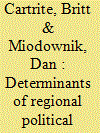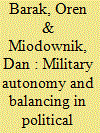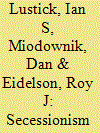|
|
|
Sort Order |
|
|
|
Items / Page
|
|
|
|
|
|
|
| Srl | Item |
| 1 |
ID:
068846


|
|
|
| 2 |
ID:
145467


|
|
|
|
|
| Summary/Abstract |
Scholarly research exploring the phenomenon of regional distinctiveness in Europe, since at least the 1960s, has generated a variety of competing theories to explain the phenomenon, including the following: the persistence of linguistic distinctiveness; the impact of economic distinctiveness; and remoteness. Often these studies operationalize “regional distinctiveness” in different ways, impeding the evaluation of different types of theories against one another. This study develops a novel measure for regional distinctiveness, applied to 161 regions in 11 European countries from 1990–2014, and demonstrates that language, economics, and remoteness work through regional parties to generate regional political distinctiveness, while only linguistic distinctiveness also has a direct effect on such distinctiveness.
|
|
|
|
|
|
|
|
|
|
|
|
|
|
|
|
| 3 |
ID:
177006


|
|
|
|
|
| Summary/Abstract |
This article argues that autonomous militaries can play a balancing role during major internal political crises. However, when militaries’ autonomy is curtailed by political leaders before the crisis, militaries cannot maintain the political balance between rulers and opponents, thereby increasing the risk of armed conflict. The article first explains the main concepts relevant to the discussion (autonomy, political crisis, balancing role), exploring their possible interlinkages and presenting several hypotheses. Subsequently, it discusses four relevant cases from the Middle East before and during the Arab revolts of 2010–2011: Egypt in 2011 and Lebanon in 1958, which demonstrate the balancing capacities of autonomous militaries during major political crises, and Lebanon in 1975 and Syria in 2011, which reveal that nonautonomous militaries cannot play a balancing role in such circumstances. The article concludes with several observations regarding the military’s balancing role during major internal political crises in divided and homogenous states.
|
|
|
|
|
|
|
|
|
|
|
|
|
|
|
|
| 4 |
ID:
146147


|
|
|
|
|
| Summary/Abstract |
Recent research has highlighted combat's positive effects for political behavior, but it is unclear whether they extend to attitudes toward the conflict itself. We exploit the assignment of health rankings determining combat eligibility in the Israel Defense Forces to examine the effect of combat exposure on support for peaceful conflict resolution. Given the centrality of the Israeli-Palestinian conflict to global affairs, and its apparent intractability, the political consequences of combat become all the more pressing. We find that exposure to combat hardens attitudes toward the rival and reduces support for negotiation and compromise. Importantly, these attitudes translate into voting behavior: combatants are likely to vote for more hawkish parties. These findings call for caution in emphasizing the benign effects of combat and underscore the importance of reintegrating combatants during the transition from conflict to peace.
|
|
|
|
|
|
|
|
|
|
|
|
|
|
|
|
| 5 |
ID:
144863


|
|
|
|
|
| Summary/Abstract |
Although past scholarship shows that group inequalities in economic and political power (“Horizontal Inequalities”) correlate with dissent, violence, and civil wars, there is no direct empirical test of the perceptual explanation for this relationship at the individual level. Such explanation is vital to understanding how integration, inclusion in power-sharing agreements, and exclusion from political power filter down to mass publics. Moreover, subjective perceptions of group conditions do not always correspond to objective group realities. We hypothesize subjective perceptions attenuate the effect of objective exclusion on support for violence in ethnically divided societies. Cross-national comparative multilevel analyses of the 2005/6 Afrobarometer dataset (N = 19,278) confirm that subjective perceptions both amplify the effect of exclusion on acceptance of violence and alter the readiness of included groups to dissent. These findings carry implications for research, state-building, and conflict management.
|
|
|
|
|
|
|
|
|
|
|
|
|
|
|
|
| 6 |
ID:
053133


|
|
|
|
|
|
|
|